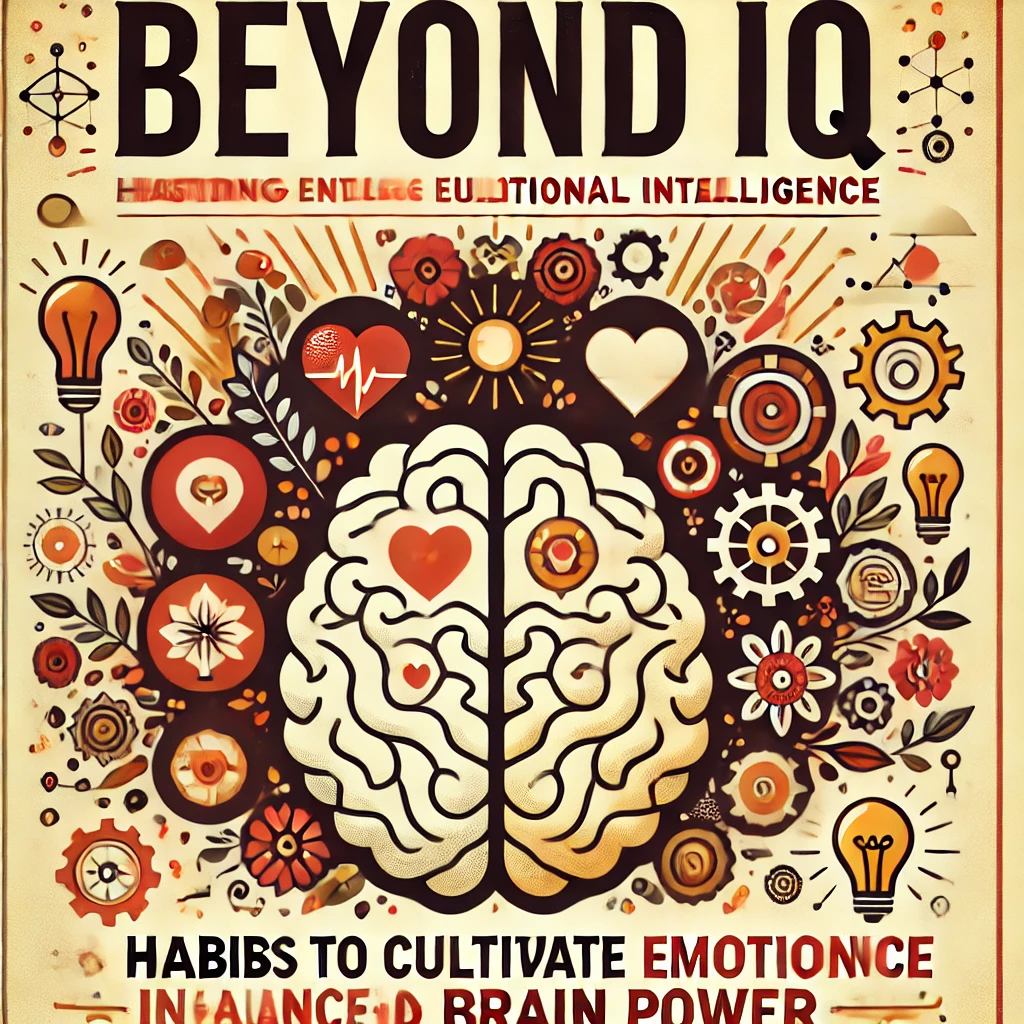Introduction
When we talk about intelligence, IQ often takes the spotlight. However, emotional intelligence (EQ) is just as crucial for navigating life, building relationships, and even boosting brain power. EQ is the ability to understand and manage your own emotions, empathize with others, and communicate effectively. These skills contribute not only to personal and professional success but also to overall cognitive health.
In this guide, we’ll explore practical habits to cultivate emotional intelligence while enhancing brain power beyond IQ. Whether you’re looking to improve communication, handle stress more effectively, or simply feel more in control of your mind, these tips will set you on the right path.
1. Practice Self-Awareness Daily
Self-awareness is the foundation of emotional intelligence. It involves recognizing your feelings, understanding what triggers them, and learning to manage your reactions. Being self-aware allows you to respond thoughtfully instead of reacting impulsively, a key skill that also strengthens cognitive control.
Habits to boost self-awareness:
- Daily Reflection: Take five minutes at the end of each day to reflect on how you felt throughout different situations. What emotions surfaced, and why?
- Journaling: Write down your feelings and thoughts to gain perspective. It’s easier to identify patterns and triggers when you put them into words.
- Body Awareness: Notice how emotions show up physically—tight shoulders, shallow breathing, or a clenched jaw. Being attuned to your body can help you catch emotions early.
Relatable anecdote:
A friend of mine started journaling for five minutes each morning to understand his mood better. He quickly realized that specific situations at work triggered stress. With this awareness, he could proactively manage his emotions by taking short breaks when those situations arose.
Pro tip:
Set an alarm to pause once a day to check in with your emotions. Ask yourself, “What am I feeling right now, and why?” Over time, this practice will strengthen your self-awareness muscle.
2. Engage in Active Listening
Active listening is a powerful way to cultivate emotional intelligence. When you actively listen, you’re not just waiting to speak but fully engaging with what the other person is saying. This practice fosters empathy and understanding, which are critical for building strong relationships and boosting brain power.
How to practice active listening:
- Maintain Eye Contact: This shows engagement and helps you focus on the conversation.
- Pause Before Responding: Take a moment to process what was said, which improves understanding and thoughtful responses.
- Ask Clarifying Questions: This shows interest and helps deepen the conversation.
Relatable anecdote:
I noticed a colleague who excelled in meetings by being an active listener. She always asked thoughtful questions, making everyone feel valued. Her approach inspired me to listen more actively, and I found that I retained more information and built stronger connections with others.
Pro tip:
Practice active listening by summarizing what the other person has said before responding. This habit reinforces understanding and empathy.
3. Strengthen Your Memory with Visualization Techniques
Visualization is a simple but effective way to improve both memory and emotional intelligence. By creating mental images of information, you engage different parts of your brain, making it easier to retain details. Visualization can also help in understanding others’ perspectives, an essential aspect of emotional intelligence.
Visualization techniques to try:
- Create Mental Images for Names and Faces: When meeting new people, associate their names with a visual cue. This makes it easier to recall names and build rapport.
- Use a “Memory Palace”: Visualize a familiar place, like your home, and place items or ideas you want to remember in different rooms.
- Imagine Emotional Scenarios: To develop empathy, visualize yourself in another person’s situation. This helps you better understand their emotions and perspective.
Example:
I started visualizing names when meeting new people at work. Not only did this help me remember names better, but it also showed my coworkers that I valued and respected them, which improved our teamwork.
Pro tip:
Practice visualization daily with small tasks, like mentally organizing your to-do list. Over time, this habit will enhance memory and empathy.
4. Cultivate Empathy Through Perspective-Taking
Empathy is the ability to understand and share another person’s feelings, and it’s a key component of emotional intelligence. Developing empathy enhances your ability to connect with others, navigate social situations, and even boost brain power through improved emotional awareness.
How to practice perspective-taking:
- Ask Open-Ended Questions: When talking to others, ask questions that invite them to share their experiences and feelings.
- Imagine Yourself in Their Shoes: Consciously try to see situations from their point of view.
- Avoid Judgment: Be open to the idea that different perspectives can coexist without being “right” or “wrong.”
Relatable anecdote:
I had a friend who always seemed to intuitively understand how others were feeling. I asked her how she did it, and she explained that she actively put herself in the other person’s shoes. I tried it out and noticed that I was better able to connect with my friends, which deepened our relationships.
Pro tip:
Challenge yourself to see things from different perspectives in daily conversations. This simple habit can help cultivate empathy over time.
5. Practice Stress-Relief Techniques to Improve Focus and EQ
Chronic stress can negatively affect both emotional intelligence and brain function. By managing stress, you can think more clearly, maintain composure, and respond thoughtfully rather than reactively.
Effective stress-relief techniques:
- Deep Breathing: Simple but powerful, deep breathing activates your body’s relaxation response, helping you stay calm and focused.
- Progressive Muscle Relaxation: This involves tensing and relaxing each muscle group, which can relieve physical tension and calm the mind.
- Mindful Meditation: Practicing mindfulness helps reduce stress, enhances focus, and improves your emotional regulation skills.
Relatable anecdote:
A coworker used to get overwhelmed by high-stress projects. She started practicing deep breathing during stressful moments, and it made a big difference. Her calmness and ability to stay focused under pressure became an inspiration to the rest of us.
Pro tip:
Take five deep breaths whenever you feel stress building up. This habit is easy to practice anywhere and can quickly help reset your emotional state.
6. Enhance Emotional Intelligence with Positive Thinking
A positive mindset doesn’t just boost mood; it can also improve emotional intelligence and cognitive health. Positive thinking helps you build resilience, which makes it easier to navigate challenges, handle criticism, and remain mentally agile.
Ways to cultivate positive thinking:
- Practice Gratitude: Write down three things you’re grateful for each day. Gratitude shifts your focus to positive aspects of life.
- Reframe Negative Thoughts: When a negative thought arises, try to see it from a different perspective.
- Spend Time with Positive People: Surround yourself with people who uplift and inspire you.
Relatable anecdote:
I started a daily gratitude practice, and over time, I found myself feeling less stressed and more appreciative of the little things. This positive shift in mindset helped me handle setbacks with a clearer, calmer perspective.
Pro tip:
Set a daily reminder to practice gratitude. Even one minute of positive thinking can improve your emotional resilience.
7. Set Personal and Professional Goals
Goal-setting is an excellent way to improve both brain power and emotional intelligence. Working toward meaningful goals gives you a sense of purpose and helps you prioritize, stay focused, and manage emotions effectively.
Effective goal-setting habits:
- Start with Small Goals: Achievable goals build momentum and encourage long-term habits.
- Break Down Larger Goals: Divide big goals into smaller, manageable steps to avoid overwhelm.
- Reflect on Progress: Take time to assess what’s working and where you can adjust. This practice builds self-awareness and resilience.
Relatable anecdote:
A friend set a goal to learn a new language, starting with just 10 minutes a day. Each milestone motivated her further, and the sense of accomplishment boosted her self-confidence and perseverance.
Pro tip:
Write down your goals and track progress. The act of physically writing goals helps reinforce commitment, building both brain power and emotional intelligence.
8. Practice Self-Compassion
Self-compassion is essential for developing emotional intelligence. Instead of being overly critical of yourself, practicing self-compassion helps you acknowledge your limitations while encouraging personal growth.
How to practice self-compassion:
- Acknowledge Your Feelings: It’s okay to feel disappointed or frustrated. Recognizing these emotions is the first step toward dealing with them healthily.
- Treat Yourself as You Would a Friend: Show yourself the same kindness and understanding you’d extend to a friend.
- Reframe Failures as Learning Experiences: Instead of being hard on yourself, look at setbacks as opportunities for growth.
Relatable anecdote:
I used to be overly critical of my mistakes, but after learning about self-compassion, I started practicing it. Now, instead of dwelling on failures, I remind myself that it’s part of the learning process. This mindset shift has not only reduced stress but also made me more resilient.
Pro tip:
Whenever you’re feeling self-critical, pause and ask yourself, “What would I say to a friend in this situation?” This simple question can encourage a more compassionate perspective.
Conclusion
Cultivating emotional intelligence is about more than just understanding and managing emotions—it’s about boosting brain power beyond IQ, creating a foundation for healthier relationships, better decision-making, and personal fulfillment. By practicing
habits like self-awareness, empathy, stress management, and self-compassion, you’re building skills that will serve you in every aspect of life.
Remember, emotional intelligence is a lifelong journey. Start small, and over time, these daily habits for emotional intelligence and brain function will help you unlock your full cognitive and emotional potential.
FAQ Section
1. How can I improve my emotional intelligence?
Practice habits like self-awareness, empathy, and stress management, which help cultivate emotional intelligence over time.
2. Does emotional intelligence boost brain power?
Yes, emotional intelligence enhances cognitive abilities by improving focus, resilience, and mental clarity.
3. How can I increase empathy?
Practice perspective-taking by imagining yourself in someone else’s shoes, and engage in active listening during conversations.
4. Can positive thinking improve brain function?
Yes, a positive outlook reduces stress, which supports better mental clarity and resilience.
5. How does self-awareness help with emotional intelligence?
Self-awareness helps you recognize and understand your emotions, making it easier to respond thoughtfully instead of reactively.
6. Why is stress management important for emotional intelligence?
Managing stress helps you stay calm and focused, which supports clearer thinking and better emotional regulation.
7. What are some daily habits to boost brain function and EQ?
Daily journaling, gratitude practice, deep breathing, and setting small goals can all enhance both brain power and emotional intelligence.
8. How does goal-setting improve emotional intelligence?
Setting and achieving goals helps build self-awareness, discipline, and resilience, all essential components of EQ.
9. What role does self-compassion play in EQ?
Self-compassion fosters emotional resilience, helping you approach setbacks with kindness and maintain a positive mindset.



